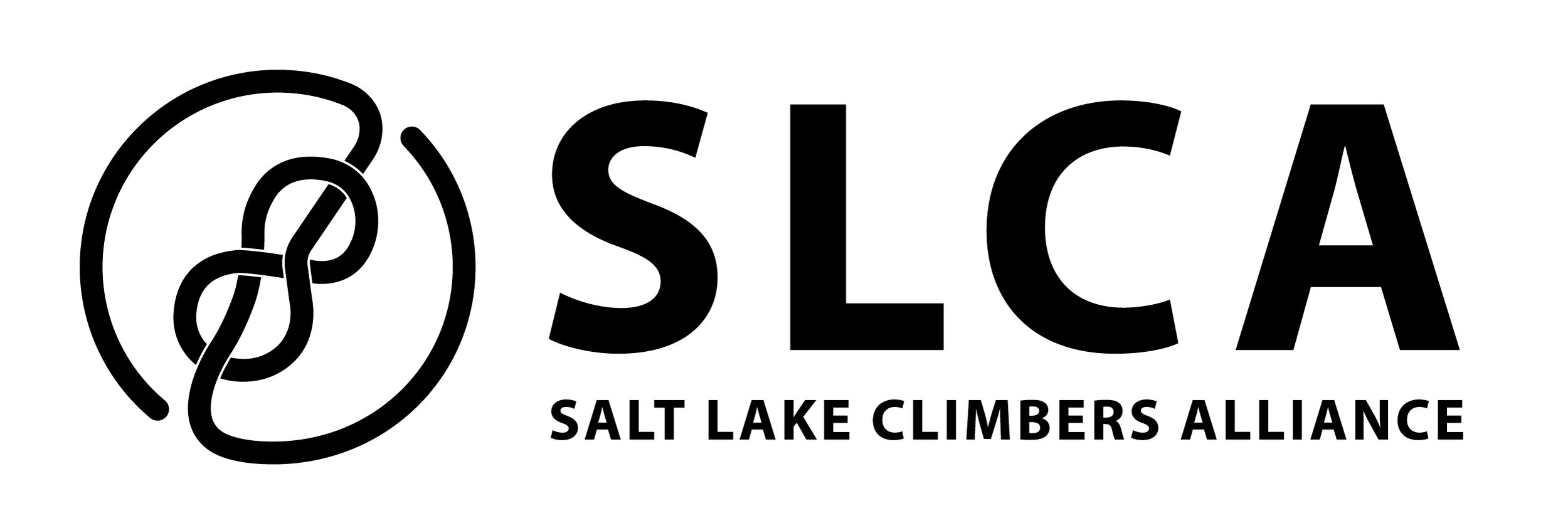Hill to Crag LCC Recap
May 17th, 2022 Hill to Crag / Little Cottonwood Canyon, UT
SLCA Executive Director with original members of the Alpenbock Club and Senator Anderegg (left to right: Senator Jake Anderegg, Dennis Thalmann, Dave Smith, Julia Geisler, Bob Springmeyer, Jerry Andregg).
On May 17th, 2022, the Salt Lake Climbers Alliance had the pleasure of hosting members of the Utah legislature, the Salt Lake County Mayor’s Office, City of Sandy Mayor’s Office, Utah Office of Outdoor Recreation, and our climbing community at the Grit Mill parking lot in Little Cottonwood Canyon (LCC). We invited our elected officials to have an on-the-ground look at the impacts that the Utah Department of Transportation’s (UDOT) preferred transportation alternatives would have on climbing and hiking resources in LCC.
Background:
In June of 2021, UDOT’s draft Environmental Impact Statement (DEIS) highlighted two preferred transportation alternatives designed to serve only ski resort users on the busiest winter days, ignoring the needs and importance of dispersed and year-round recreation user groups, as well as compromising climbing and hiking opportunities.
UDOT’s preferred alternatives include a gondola or adding additional lanes to LCC. Both run from the mouth of the canyon to ski resorts, with no mid-stops for dispersed recreationalists.
Key impacts of the UDOT proposals of a gondola or additional lanes:
The proposals are fiscally irresponsible, with initial construction costs estimated at over $500 million each.
Both proposals have unacceptable impacts to dispersed recreation and fail to solve the LCC transportation problem.
These proposals involve the destruction of irreplaceable world-class climbing resources and the overall climbing and hiking experience at risk of being impacted or completely eliminated.
These proposals permanently alter the canyon, impact the iconic natural character, and result in cumulative impacts to our watershed.
Ease of access to climbing and hiking will be compromised by parking lot alterations and removal of roadside parking as well as limited during construction time.
It was a great turnout between SLCA board and committee members, state legislators, and other groups at SLCA’s Hill to Crag event on May 17th, 2022.
After hearing from Ted Wilson, Mayor Jenny Wilson, and others about the importance of LCC to so many user groups, we hiked part of the Alpenbock Loop trail to the Cabbage Patch climbing area. Many of those that attended the event were unaware of the Alpenbock Loop trail or that some of the climbing areas were so close to the road. Some were unfamiliar with climbing in general and just wanted to learn more about it. It was an excellent opportunity to connect members of our climbing community with members of the state legislature. The SLCA shared the importance of climbing and other human powered dispersed recreation access in LCC, as well as the destructive impacts that UDOT’s transportation proposals will have on the canyon.
In 2011, nearly 50 years after Ted Wilson established the first formal climb in LCC (Chickenhead Holiday), planning and fundraising began for the Alpenbock Loop project out of recognition of over-use and degradation of the landscape. Since then, the SLCA has put over a half million dollars and countless volunteer hours into creating sustainable infrastructure in lower LCC through the Alpenbock Loop trail system and at the Gate Buttress. The SLCA’s stewardship efforts in lower LCC have been supported by public and private sources including local, state, and federal grants. The trail data we collect suggests that this multi-use trail is increasing in popularity and is used year-round.
Climbing and outdoor recreation are an economic driver in Utah:
3 of 4 survey respondents said that climbing was a major factor in their decision to live along the Wasatch Front.
82% of Utah natives cited in the tech industry cited outdoor recreation access as their reason for returning to Utah. 79% of transplants said that outdoor recreation access was the most important factor for choosing to live in Utah.
More than twice as many direct jobs in Utah depend on outdoor recreation as on mining and energy combined.
It was estimated in 2020 that outdoor recreation contributed $4.9 billion to Utah’s economy, likely a low figure as a result of the COVID-19 pandemic.
SLCA board member Amy Cairn hiking with legislators Senators Kathleen Riebe and Jake Anderegg and Representative Carol Moss.
The SLCA maintains that less impactful solutions exist. We are advocating for a low impact, fiscally responsible transportation solution that serves all canyon users year-round.
What you can do:
UDOT plans to release their final EIS within the next few months. Right now, it’s the “interim session” for our legislature (this is when plans get made for the next general session in 2023). Give your legislators a call and let them know that this is an important issue for you and that less impactful solutions should be implemented and faithfully be determined insufficient before making any permanent changes to the canyon. Make your message personal and genuine, if you need pointers check out our Advocacy Toolkit.
Keep an eye out for other events like this in the coming months!
Jimmy Keithley giving a demonstration of bouldering and Julia Geisler talking about the impacts to the Cabbage Patch Area. According to our analysis using data from UDOT’s DEIS, the roadside boulders at Cabbage Patch will be impacted by the road widening alternative.




